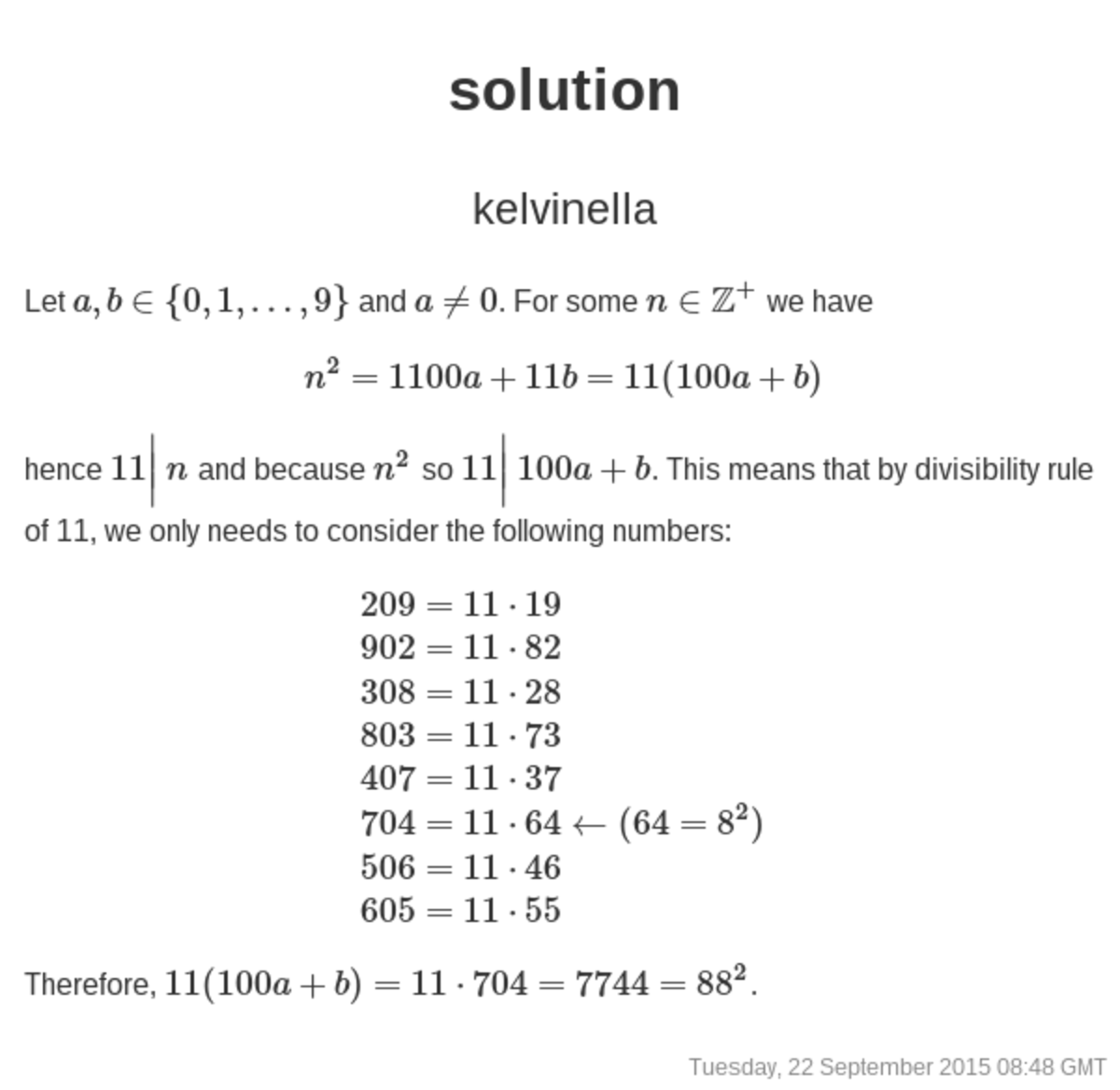Square number
Determine the four digit perfect square whose first two digits are the same, and whose last two digits are the same.
The answer is 7744.
This section requires Javascript.
You are seeing this because something didn't load right. We suggest you, (a) try
refreshing the page, (b) enabling javascript if it is disabled on your browser and,
finally, (c)
loading the
non-javascript version of this page
. We're sorry about the hassle.
4 solutions
Excellent solution, Gabe. Are there any six digit perfect squares whose first three digits are equal and whose last three digits are equal? I didn't find any, but maybe you can.
Log in to reply
couldn't think this far
No, there are not.
We'd have x 2 = 1 1 1 ( 1 0 0 0 a + 1 1 1 b ) . Since 1 1 1 = 3 7 ⋅ 3 , we'd need both:
1) 1 0 0 0 a + 1 1 1 b ≡ 0 ( m o d 3 ) ; in this case, a ≡ 0 ( m o d 3 ) .
2) 1 0 0 0 a + 1 1 1 b ≡ 0 ( m o d 3 7 ) ; in this case, because 1 0 0 0 ≡ 1 ( m o d 3 7 ) , we would require a ≡ 0 ( m o d 3 7 ) . This has no solution with a a single-digit number.
Hey Gabe How you determined 209,308,407,506,605,...,902
If the first two digits and alst two digits are identical, then the number must be a multiple of 11. Since it is a perfect square, it must be a multiple of 121 (Euler's theorem of prime factor representation of an integer).
Perfect squares end in 0,1,4,5,6,9. If the last digit is an odd number then the tens digit of a perfect square should be even (Any odd perfect square=(10x+1)^2=100x^2+20x+1 or (10x+3)^2=100x^2+60x+9 or (10x+5)^2=100x(x+1)+25 or (10x+7)^2= 100x^2+140x+9 or (10x+9)^2=100x^2+180x+9 in each case 10s digit is even). Since last two digits are identical, the number cannot be odd
Hence last two digits must be 00, 44 or 66. An even perfect square is of the form (2x)^2=4x^2 and is a multiple of 4. Hence the number cannot end in 66
If the number ends in 00 then we have a multiple of 11 which is a perfect square. The smallest such multiple of 11 is 121 which is 11 * 11 and hence no single digit multiple satisfies it. Therefore, last two digits have to be 44. Then x is of the form AA44. x/11 is of the form A04 which is also a multiple of 11 (since x is a multiple of 121). Hence A=7, i.e., x=7744
I solved it by first seeing the range of numbers which could be squared to obtain a 4 digit number which satisfies the conditions stated in the question. The range, hence, starts from above 30 (whose square is 900). According to the question, the square has the first two digits same, and the last two same. This satisfies the rule of being divisible by 11. Thus the number (which is squared to obtain a 4 digit number) has to be divisible by 11 too. Thus starting from 30 we can take all the numbers which are divisible by 11, into consideration, and by trial and error, we can quickly find that 88 satisfies. The square of 88 is 7744. Thus that is the answer.

If the number is A A B B = 1 1 0 0 A + 1 1 B = 1 1 ( 1 0 0 A + B ) , then 1 0 0 A + B = A 0 B must be the product of 11 and a perfect square. The only multiples of 11 in the form A 0 B are:
2 0 9 = 1 1 ⋅ 1 9
3 0 8 = 1 1 ⋅ 2 8
4 0 7 = 1 1 ⋅ 3 7
5 0 6 = 1 1 ⋅ 4 6
6 0 5 = 1 1 ⋅ 5 5
7 0 4 = 1 1 ⋅ 6 4 , which satisfies our criteria!
8 0 3 = 1 1 ⋅ 7 3
9 0 2 = 1 1 ⋅ 8 2
Thus, A = 7 and B = 7 , so the perfect square is 7 7 4 4 = ( 1 1 ⋅ 8 ) 2 .